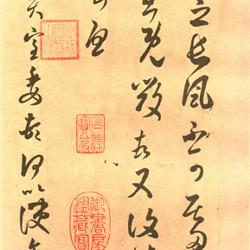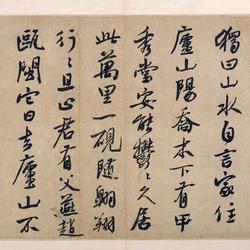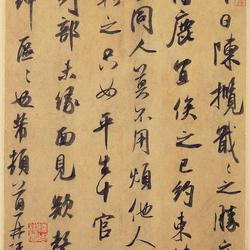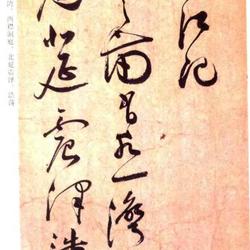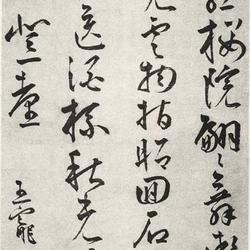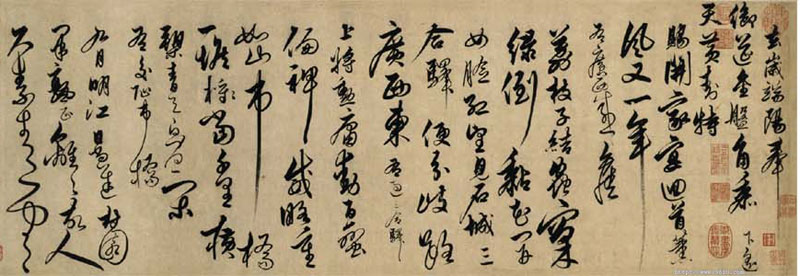
Xie Jin's "Self-written Poems in Cursive Script" on paper, hand-scrolled, 34.3cm in length and 472cm in width, collected by the Palace Museum in Beijing
This painting contains a total of 7 self-composed poems, which were written by Xie Jin when he was an official in Jiaozhi, Guangxi from 1407 to 1410. Except for the sixth poem "Passing Teng County", the other six poems are all found in Xie Jin's "Wenyi Collection", and some of the poems are different from each other.
The work was created in the eighth year of Yongle (1410), when Jie Jin was 42 years old and came to Beijing from a distant border to perform work. He was imprisoned soon after and died tragically in prison five years later. The calligraphy in this volume is vertical and horizontal, unrestrained and unrestrained, with well-regulated dots and lines, and nothing sloppy or far-fetched. The composition and management are particularly ingenious, and the whole article is completed in one go, with a confident air, showing Jie Jin's extraordinary ability to control long scrolls with ease. From the self-awareness at the end of the volume, it is revealed that Xie Jin himself is quite proud of this volume. He gave this proud work to Zhenqi, who was the son of Xie Jin's brother Xie Lun. The title of the book did not lose his family style.
Behind the painting is a postscript written by King Ming. There are a total of 25 seals from various families. It was once collected by the imperial palaces of Anqi, Qianlong, Jiaqing and Xuantong in the Qing Dynasty. It is recorded in books such as "The Spectacular Life", "Mo Yuan Hui Guan", "The Continuation of Shiqu Baoji", and "Shiqu Essays". (Writer: Hua Ning)
Explanation:
Last year, during the Dragon Boat Festival, there was an imperial banquet. The golden plate of millet was far away in the sky. Huang Feng specially opened a family banquet, looking back at Xunfeng for another year. Right Guangxi feels old.
The lychees are green with worms, and the flowers are sticky and the women are blushing. When I saw Sanhe Post Station in Shicheng, I branched off to the east of Guangxi. Pass Sanheyi on the right.
General Xianyong moved hundreds of barbarians, but his power was as heavy as a mountain. The city bridge is a thousand miles away, and the sky is clear in the daytime. Turn right to the city bridge.
It is still late in September, and the fruits in the village garden are ripe. The old friend's feet are under the blue clouds, and yellow mandarin jade is hanging behind the book. The golden Ganoderma lucidum is used as millet, and the leaves are numerous and mist-green as branches. Xi Gong often comes to the capital, and I still recall the time when Jin Pan came to the imperial court. Thanks to my friend Hui Huanggan.
Cangwu City is connected to Longzhou in the north, and water flows day and night in the south. Spring grass blooms in the icy well crocodile pond, and the volcanic dragon chamber floats at night. Thousands of bamboo huts face the sand spit, and thousands of dendrobium nets are used to cast stones under the boat. I am lying on my pillow and dreaming that I am close to Han Dynasty, and the sound of admiration is still in the Phoenix Tower. Pass Wuzhou on the right.
The Yan River flows eastward to meet the Yujiang River, and Guteng City Guo Town is located in the south. The mountains, clouds and bridges merge with flying rainbows, and the river moon tower is empty with milk and swallows. On a sunny day, the mandarin flowers are red and the brocade is blooming, and the spring breeze is smoky and the trees are green and green. Blowing the flute evokes the dance of dragons, and the golden duck burns incense and fills the jade vat. Pass through Teng County on the right.
Guests who have been there for a long time will rest when they return home, and their countryside will be flooded everywhere. A thousand bells of dripping palace brocade are drunk, and there is no need for thousands of households in the world. I made it occasionally when I returned home from the right.
These few poems I have written recently were all written by you, and now I have written them down by you. Although, I don’t dare to abandon the past and do my own thing. The wonders of double writing, covering writing, and returning writing in the middle can be distinguished by those who are knowledgeable. On the night of May 23rd in Gengyin, Yongle, I lived in the capital and wrote a book about it. Jin gentry knowledge.

